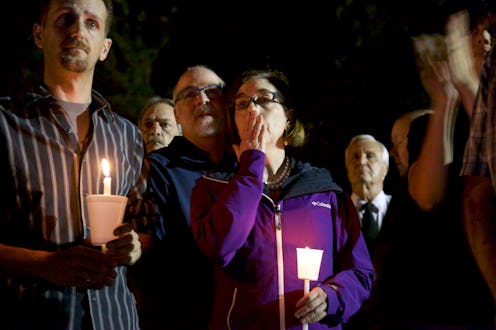News
The UCC Killer's MySpace Profile Doesn't Matter
On Thursday morning, news broke that a mass shooter was active on the campus of Umpqua Community College in Roseburg, Ore. Police officials have since confirmed that 10 were killed at Umpqua, including the shooter, who was taken down by police, and seven other people were injured. The alleged shooter has been identified as Chris Harper Mercer, a 26-year-old male who lived a short distance from the UCC campus. The Washington Times has reported that Harper Mercer was neither a student nor an employee of the school. As details continue to emerge about the shooting, much attention is being drawn to Harper Mercer's MySpace page, and the very telling photos he published on his profile.
When looking at his MySpace profile, it immediately becomes evident that Harper Mercer had a fascination with firearms and military violence. The Guardian reports that Harper Mercer was born in England, and his MySpace reveals that he was a supporter of the Irish Republican Army, a revolutionary military group in Ireland that fights in favor of Irish independence from the United Kingdom. The IRA is considered by many to be a terrorist organization.
Beyond several photos of IRA members (one which is captioned "Looking cool defending their country"), Harper Mercer's profile photo is one of himself holding a rifle.
Looking at Harper Mercer's profile, however, doesn't seem to reveal anything that we haven't come to expect from a person who commits a mass murder, and analysis of his page seems redundant. In fact, I would be surprised if Harper Mercer's social media did not feature photos of him wielding weapons, and if he did not have a distinct interest in a controversial and violent group. We've seen this same type of public image emerge less than four months ago from the alleged Charleston shooter, Dylann Roof, whose social media showed multiple photos of him with confederate flags and firearms.
There is a public thirst for personal information about extreme social outliers such as mass murderers, and that curiosity is to be expected when so much information usually is readily available with minimal amounts of research. In some cases, learning more about a mass shooter through their social media accounts sparks helpful conversations that leads to action, such as in the case of Dylann Roof. Following undeniable evidence that Roof supported racist ideologies, a national conversation around the inherent problems with displaying confederate flags led to the removal of the confederate flag from South Carolina's capitol grounds.
While the specific motivations behind mass killings will vary and are often more complicated to address and fix (racism, for example, is a deep-seated and institutionalized problem, and fixing the problems that arise from racism is not a simple endeavor), many agree that gun legislation would at least begin to stop the huge numbers of gun-related killings that occur in the U.S. each year. It's not possible to legislate away a racism problem, but the government can take action to prevent violent or potentially violent individuals from owning dangerous weapons.
The issue of gun violence and gun legislation should be at the forefront of the conversation that follows mass shootings, coupled with ongoing efforts to eliminate if not at least subdue the real and harmful motivators that drive shooters. It is vitally important to discuss the social factors that contribute to mass killings, which are often identifiable after uncovering personal information about shooters; the most imminent need is to create legislative stop gaps that would disallow ill-intentioned persons to have access to firearms.
Image: MySpace
